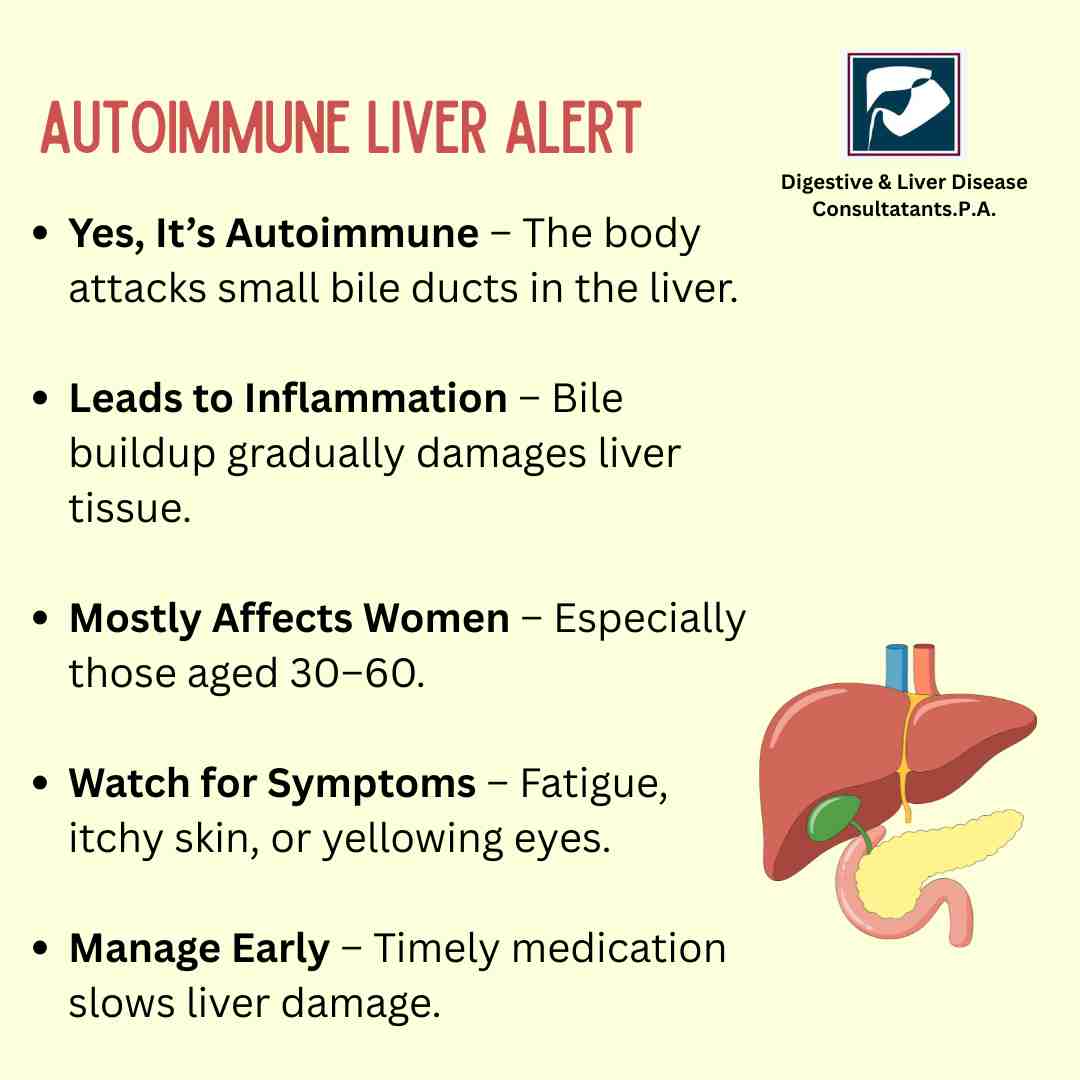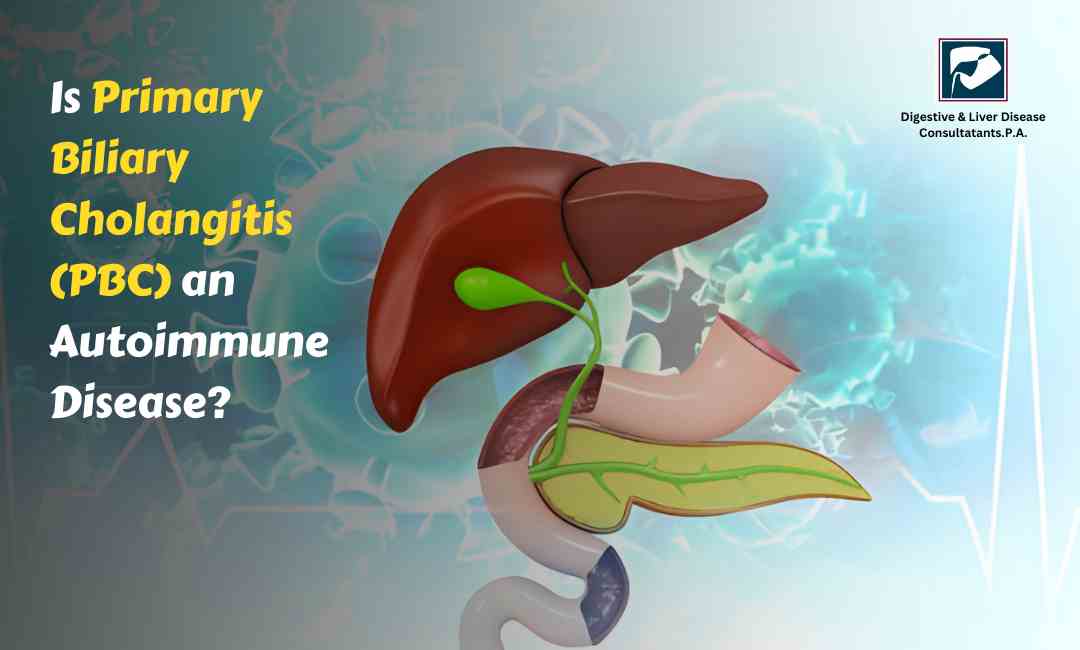Primary Biliary Cholangitis, or PBC, is a long-term liver disease that gradually damages the small bile ducts inside your liver. These ducts carry bile, a fluid that helps digest fats and eliminate toxins. When they get inflamed or blocked, bile builds up, leading to liver damage over time.
Many people wonder, Is PBC an autoimmune disease? The answer is yes. PBC happens when your immune system mistakenly attacks your own liver cells. Let’s understand what causes it, how it develops, and how doctors treat it.
What Is Primary Biliary Cholangitis (PBC)?
PBC mostly affects middle-aged women, but men can get it too. The condition starts with inflammation in the small bile ducts. Over time, this inflammation leads to scarring and cirrhosis if untreated.
Because PBC develops slowly, many people discover it accidentally during routine blood tests that show abnormal liver enzymes.

Why Is PBC an Autoimmune Disease?
In autoimmune diseases, the immune system, which normally protects you from infections, mistakenly attacks healthy cells.
In PBC, the immune system produces antimitochondrial antibodies (AMA) that attack the cells lining your bile ducts. This causes inflammation, blockage, and gradual liver damage.
Doctors are still studying the exact reason this happens, but they believe it involves a mix of genetic, hormonal, and environmental factors.
What Increases the Risk of PBC?
Several factors can make someone more likely to develop PBC:
Gender: Women are at much higher risk.
Age: It commonly appears between 30 and 60 years.
Family history: If a close relative has PBC or another autoimmune disorder, your risk increases.
Other autoimmune diseases: Thyroid disorders, rheumatoid arthritis, or Sjögren’s syndrome often occur with PBC.
Environmental triggers: Exposure to chemicals, infections, or smoking may trigger the condition.
Common Symptoms of PBC
Early stages often show no symptoms, which makes diagnosis tricky. As the disease progresses, symptoms may include:
- Fatigue or low energy
- Itchy skin
- Dry eyes or dry mouth
- Pain or discomfort in the upper right side of the abdomen
- Dark urine or pale stools
- Yellowing of the skin or eyes (jaundice)
- Joint or muscle pain
In advanced cases, PBC can cause cirrhosis, swelling in the abdomen (ascites), and bone loss (osteoporosis).
How Is PBC Diagnosed?
A gastroenterologist or liver specialist (hepatologist) diagnoses PBC through several tests:
Blood tests: To check liver enzyme levels and antimitochondrial antibodies (AMA).
Liver function tests: To see how well your liver is working.
Imaging tests: Ultrasound, MRI, or MRCP scans help rule out other bile duct issues.
Liver biopsy: Sometimes done to confirm the diagnosis and assess liver damage.
Treatment and Management Options
There is no complete cure for PBC, but early treatment can slow down its progression and improve quality of life.
1. Medications
- Ursodeoxycholic Acid (UDCA): Improves bile flow and protects liver cells.
- Obeticholic Acid (OCA): Used if UDCA isn’t enough.
- Fibrates: May reduce bile acid buildup and improve liver function.
2. Managing Symptoms
- Itchy skin: Treated with antihistamines or bile acid binders.
- Fatigue: Managed through better sleep, balanced nutrition, and regular exercise.
- Dry eyes or mouth: Artificial tears or saliva substitutes may help.
3. Lifestyle Changes
- Avoid alcohol and smoking.
- Eat a balanced diet rich in fruits, vegetables, and lean protein.
- Stay physically active to maintain strength and energy.
- Get vaccinated against hepatitis A and B.
4. Liver Transplant
If liver damage becomes severe, a liver transplant may be needed. This option has a high success rate and can restore normal liver function.
Living with PBC
With regular monitoring and treatment, many people live long, healthy lives with PBC. Regular doctor visits, blood tests, and healthy habits are key to slowing disease progression.
Expert Liver Care at Digestive & Liver Disease Consultants, P.A.
At Digestive & Liver Disease Consultants, P.A., our board-certified gastroenterologists and hepatologists specialize in the diagnosis and management of autoimmune liver diseases like PBC. We use advanced diagnostic tools, personalized treatment plans, and continuous follow-up to help patients maintain good liver function and live comfortably.
When Should You See a Liver Specialist?
Are you feeling constantly tired, itchy, or have unusual liver test results? These could be early signs of PBC. Early diagnosis helps prevent complications and improves outcomes.
Conclusion
So, is Primary Biliary Cholangitis an autoimmune disease? Yes, it is. PBC occurs when your immune system mistakenly attacks your liver’s bile ducts, leading to inflammation and scarring. While it can’t be completely cured, it can be managed effectively with medication and lifestyle changes.
If you suspect symptoms of PBC or have abnormal liver test results, schedule a consultation with Digestive & Liver Disease Consultants, P.A. Our team provides expert care, accurate diagnosis, and personalized treatment to help protect your liver and overall health.
Contact us today to take the first step toward better liver health.






